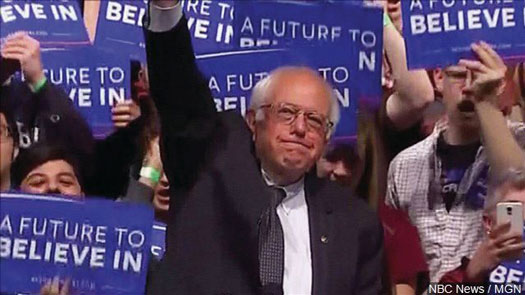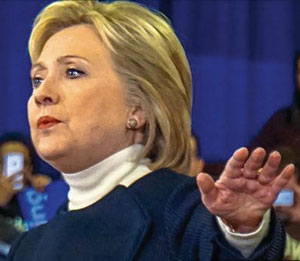Sanders Sticking Around Despite Clinton Political Machine
By Askia Muhammad -Senior Editor- | Last updated: Apr 13, 2016 - 12:52:01 PMWhat's your opinion on this article?

Bernie Sanders wins the Wisconsin Democratic primary, Apr. 5. Photo: MGN Online
Many young, Black Sanders supporters say Sen. Sanders speaks more directly to issues of race and inequality than Sec. Clinton. Critics have taken her to task for describing young, Black males as “super-predators” in 1994 and for advocating for and supporting the crime bill which her husband, then President Bill Clinton signed into law. |
WASHINGTON— It is very likely that in early 2015 when he began organizing his presidential campaign, Sen. Bernie Sanders who has represented the state of Vermont as an Independent for several years, imagined he might lead a socialist revolution, or at least a movement which could transform U.S. politics, and drive the national agenda for a generation. What was less certain at that time was that this Sanders campaign would prove to be as wildly popular among Democratic voters as it has, earning for itself an important role in the Democratic National nominating convention in Philadelphia in July.
And while Sen. Sanders is widely viewed as someone who is standing up to Wall Street profiteers, while challenging the conventional wisdom about U.S. military engagement, he has almost no profile in the Black community.
“Who is he? He’s a self-proclaimed Democratic-Socialist, which to most Americans means absolutely nothing, other than he’s a Communist,” political scientist Dr. Wilmer Leon, host of “Inside the Issues” heard on SIRRIUS-XM Satellite Radio told The Final Call. “People have a tendency to equate socialism and communism.”
The likely GOP strategy in a general election campaign against Sen. Sanders would amount to figuratively draping a hammer-and-sickle—the Soviet Communist symbol—around Sen. Sanders’s neck in every depiction of him. It would not be difficult to portray Sen. Sanders as a borderline communist. “Absolutely, absolutely not,” said Dr. Leon.
When it comes to Black voters however, Sen. Sanders is not a socialist, he’s not a capitalist, and he’s an unknown quantity. “Overall, he has not really demonstrated any consistent involvement in issues that resonate within the African American community. He has no track record,” said Dr. Leon.

Hillary Clinton
|
“Bernie Sanders has not reached out, as far as I can discern, in any practical, working way, to develop friendships and relationships with people who are influential in the African American community,” Dr. Leon said.
For example: “Black voters don’t have a transactional mentality in terms of candidates,” Dr. David Bositis, a political scientist and statistician, told The Final Call. “Bernard Sanders is a stranger. He’s a White stranger, who has never had anything to do with them or with Black politics; who knows nothing about Black people or Black politics. And Hillary Clinton has been involved with Black politics for 30 or 40 years.”
But there is this true, socialist revolution which Sen. Sanders has inspired which surpasses the post-Vietnam reform era of the 1970s, and which harkens to the postdepression socialist-revolutionary era of the 1930s, and has always been about more than just an election according to author Harold Myerson.
“I actually don’t think that Bernie Sanders when he entered this campaign really thought he could win the election,” Mr. Myerson, executive editor of The American Prospect and vice chair of the Democratic Socialists of America told Mitch Jesserich on Pacifica Radio’s “Letters and Politics.” “Sanders is a realist, he was heartened by the response his campaign got and was surprised by it.
“I think originally he thought he was doing this to raise a whole panoply of issues, that Americans have been basically concerned about—what was wrong with American capitalism. He ended up getting a much greater response, I think, than he had envisioned.”
“I think he still sees the deeper purpose of this campaign, as really changing American politics—the domination that Wall Street and wealth holds over both the economy and politics in this country. Therefore, it’s really about building something really enduring that will change both the Democratic Party and the Left in this country describes it’s trying to achieve through political engagement,” Mr. Myerson said.
Those Sanders goals don’t translate quickly into Black “retail” political transactions. “How many meetings of Black organizations, and civil rights organizations in the South do you think Bernie Sanders has gone and spoken at? Zero would be a good estimate,” said Dr. Bositis. “Hillary has probably spoken to a thousand. How many of those organizations has she helped raise money for? That’s why virtually every single Black political figure is supporting Hillary Clinton. African Americans are loyal to Hillary Clinton, and they are going to continue supporting her,” said Dr. Bositis.
Young Black voters are attracted to the Sanders campaign in greater numbers than their older counterparts because Sen. Sanders articulates for them issues which speak to their future. “In terms of the young demographic, he’s speaking to a lot of issues with them: free college, free health care—socialized medicine. Based upon the current economic landscape in this country, and where the economy seems to be headed, Bernie is speaking to issues of the present, which will also greatly impact our future and are going to have a much greater impact on the lives of college-age students, than they are currently having on the lives of retirees or people who are about to retire,” said Dr. Leon.
Enter The Dream—the “Socialist Utopia.”
“We have to confront the kind of bizarre fact,” said Mr. Myerson, “that polling, if you look closely shows by my standards, an astonishing number of Americans— mainly in and around the Democratic Party, or left-leaning independents, pretty much identifying themselves as socialists, at least since the crash of 2008, and this, in the polling, shows up before Bernie Sanders announces for president.”
Many young, Black Sanders supporters also say Sen. Sanders speaks more directly to issues of race and inequality than Sec. Clinton. Critics have taken her to task for describing young, Black males as “superpredators” in 1994 and for advocating for and supporting the crime bill which her husband, then President Bill Clinton signed into law.
Sen. Sanders was a member of the House of Representatives and voted for the law though he expressed reservations then about certain provisions in the bill.
He spoke to Sec. Clinton’s use of the “super-predator” term during a Sunday morning news program. “Look, I think we all knew back then what that language meant. That was referring to young Blacks. And I don’t think in this country, elected officials or leaders should be using that type of terminology,” Sen. Sanders told George Stephanopolous, April 10 on ABC.
Despite lagging behind Clinton in terms of delegates needed to secure the Democratic presidential nomination, Sanders is fresh off primary victories in several states as the two set to debate in Brooklyn April 14 ahead of the New York primary slated for April 19.
INSIDE STORIES AND REVIEWS
-
-
About Harriett ... and the Negro Hollywood Road Show
By Rabiah Muhammad, Guest Columnist » Full Story -
Skepticism greets Jay-Z, NFL talk of inspiring change
By Bryan 18X Crawford and Richard B. Muhammad The Final Call Newspaper @TheFinalCall » Full Story -
The painful problem of Black girls and suicide
By Charlene Muhammad -National Correspondent- » Full Story -
Exploitation of Innocence - Report: Perceptions, policies hurting Black girls
By Charlene Muhammad -National Correspondent- » Full Story -
Big Ballin: Big ideas fuel a father’s Big Baller Brand and brash business sense
By Bryan Crawford -Contributing Writer- » Full Story






 Click Here Stay Connected!
Click Here Stay Connected!








